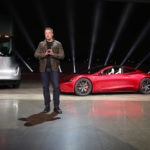A day in the futuristic world of Elon Musk
Novels, movies, articles ... much has been written about the future. From Jules Verne’s famed Journey to the Center of the Earth to flying cars that promise to revolutionize commuting. With the passage of time, ideas that seemed outlandish in the past have become a reality, causing us to think that ideas that seem impossible just might materialize.

There are people in this world who are not satisfied with merely reading about the future, rather they need to shape it. Clear examples can be found in the intellect behind some of the inventions that have revolutionized modern life: from cars and airplanes to personal computers and smartphones. Elon Musk, co-founder of companies such as Paypal and Tesla Motors, is one of these intellects. The eccentric billionaire is a controversial figure – often due to his disconcerting publications on Twitter – but without going into whether he is a madman or a visionary, what would a day in the futuristic world of Elon Musk look like?
The alarm goes off, but it's still too early, and the sun hasn't come up. Not a problem, because the house now uses 100% clean energy, thanks to Tesla's Solar Roof, the solar panel that Elon Musk has even installed at his own house. A system of batteries powered by the sun’s light and with enough capacity to easily power a private home.
It's time to get ready for work. Typically, there isn't much time in the morning. Eating breakfast and preparing lunch first thing in the morning may cease to be a priority if a glance at the clock tells you you're going to be late. All this stress disappears with the purchase of a domestic robot, which, with the help of artificial intelligence, will have your coffee ready and lunch box packed for the office. It can also take care of the rest of the household tasks while you’re away from home.
After enjoying a great breakfast prepared by the robotic assistant, it's time to go to work. Your house already runs on clean energy, so of course you can’t expect anything less of your car. Tesla's Model X waits in the garage with fully-charged batteries, ready to cruise down the highway. It's air-conditioning system works so well that its HEPA filter protects its passengers from both pollen and bacteria as well as from attacks from biological weapons. Just like a tank, but with a much more aerodynamic design.
The car is ready to take its driver to the ends of the earth, but for all that Tesla might be, not even Elon Musk lives without traffic jams.
Traffic is driving me nuts. Am going to build a tunnel boring machine and just start digging...
— Elon Musk (@elonmusk) 17 de diciembre de 2016
Luckily, this article is written from somewhere in the future, and traffic jams are a thing of the past. Since the creation of Urban Loop it's possible to “park” the car on one of its platforms, leaving it to be propelled along one of the subterranean network’s tunnels. This transportation system will reach speeds of up to 200 km/h (120mph), managing to get you to work in record time. It's also suitable for public transportation.
Once at work, the time comes to meet clients in San Francisco. You don’t want to resort to a teleconference while you are in Los Angeles, for example; no problem: with Hyperloop, also created by The Boring Company, travel time will be about half an hour – forty-five minutes less than an airplane and without the related waiting time at the airport.
Elon Musk's revolution has reached further than national travel. In a world that is growing more and more global, long distance trips might represent a barrier due to time lost when travelling. SpaceX’s founder has still not found the solution to jet lag, but he has been able to cut travel times of flights from more than 15 hours to 39 minutes, such as the journey from New York to Shanghai. All this thanks to Big F*cking Rocket (BFR), a rocket that takes off from a nautical base to be launched into space, later to return to earth's atmosphere and land on a platform located at the destination.
Unfortunately history is not only marked by watershed moments and discoveries, but factors such as global warming can represent a significant threat to the world and its inhabitants. Anticipating potential catastrophe, SpaceX's founder wanted to offer the human race an alternative in the face of a possible extreme emergency. If required, human colonies on Mars could ensure the preservation of the species. In a future imagined by Musk, colonies will have their own pizzerias and nightclubs even with as many light years that separate Earth from the red planet.